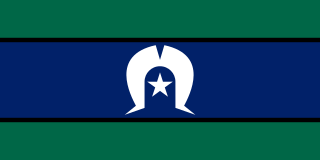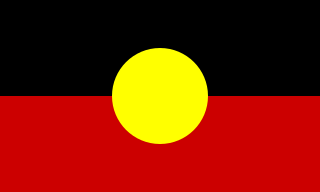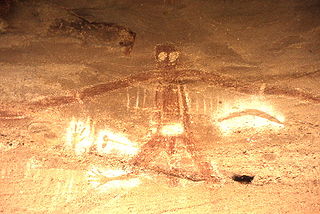Related Research Articles

The Torres Strait Islands are a group of at least 274 small islands in the Torres Strait, a waterway separating far northern continental Australia's Cape York Peninsula and the island of New Guinea. They span an area of 48,000 km2 (19,000 sq mi), but their total land area is 566 km2 (219 sq mi).

The Aboriginal and Torres Strait Islander Commission (ATSIC) (1990–2005) was the Australian Government body through which Aboriginal Australians and Torres Strait Islanders were formally involved in the processes of government affecting their lives, established under the Hawke government in 1990. A number of Indigenous programs and organisations fell under the overall umbrella of ATSIC.

Torres Strait Islanders are the Indigenous Melanesian people of the Torres Strait Islands, which are part of the state of Queensland, Australia. Ethnically distinct from the Aboriginal peoples of the rest of Australia, they are often grouped with them as Indigenous Australians. Today there are many more Torres Strait Islander people living in mainland Australia than on the Islands.
Native title is the designation given to the common law doctrine of Aboriginal title in Australia, which is the recognition by Australian law that Indigenous Australians have rights and interests to their land that derive from their traditional laws and customs. The concept recognises that in certain cases there was and is a continued beneficial legal interest in land held by Indigenous peoples which survived the acquisition of radical title to the land by the Crown at the time of sovereignty. Native title can co-exist with non-Aboriginal proprietary rights and in some cases different Aboriginal groups can exercise their native title over the same land.

Aboriginal Australians are the various First Nations peoples of the Australian mainland and many of its islands, such as the peoples of Tasmania, Fraser Island, Hinchinbrook Island, the Tiwi Islands and Groote Eylandt, but excluding the ethnically distinct Torres Strait Islands. The term Indigenous Australians refers to Aboriginal Australians and Torres Strait Islanders collectively.
The National Native Title Tribunal (NNTT) is an independent body established under the Native Title Act 1993 in Australia as a special measure for the advancement and protection of Aboriginal and Torres Strait Islander peoples. It manages applications for and administration of native title in Australia.

An Australian Aboriginal sacred site is a place deemed significant and meaningful by Aboriginal Australians based on their beliefs. It may include any feature in the landscape, and in coastal areas, these may lie underwater. The site's status is derived from an association with some aspect of social and cultural tradition, which is related to ancestral beings, collectively known as Dreamtime, who created both physical and social aspects of the world. The site may have its access restricted based on gender, clan or other Aboriginal grouping, or other factors.
The Tandanya National Aboriginal Cultural Institute, usually referred to as Tandanya, is an art museum located on Grenfell Street in Adelaide, South Australia. It specialises in promoting Indigenous Australian art, including visual art, music and storytelling. It is the oldest Aboriginal-owned and -run cultural centre in Australia.
Land councils, also known as Aboriginal land councils, or land and sea councils, are Australian community organisations, generally organised by region, that are commonly formed to represent the Indigenous Australians who occupied their particular region before the arrival of European settlers. They have historically advocated for recognition of traditional land rights, and also for the rights of Indigenous people in other areas such as equal wages and adequate housing. Land councils are self-supporting, and not funded by state or federal taxes.
Kimberley Land Council Aboriginal Corporation, known as Kimberley Land Council (KLC), is an association of Aboriginal people in the Kimberley region of Western Australia. The land council was formed at a meeting at Noonkanbah Station in May 1978. The corporation is registered with the Office of the Registrar of Indigenous Corporations as ICN 21.
A Registered Native Title Body Corporate (RNTBC) is a corporation nominated by a group of Aboriginal or Torres Strait Islander people for the purposes of native title in Australia, to represent their native title rights and interests, once that group's native title application has been recognised in a Federal Court of Australia determination, and the corporate body registered. The corporation nominated hold and manage or manage before native title determination and registration, is called a Prescribed Body Corporate (PBC).
Indigenous Australians are both convicted of crimes and imprisoned at a disproportionately higher rate in Australia, as well as being over-represented as victims of crime. As of September 2019, Aboriginal and Torres Strait Islander prisoners represented 28% of the total adult prisoner population, while accounting for 2% of the general adult population. Various explanations have been given for this over-representation, both historical and more recent. Federal and state governments and Indigenous groups have responded with various analyses, programs and measures.
Indigenous land rights in Australia, also known as Aboriginal land rights in Australia, are the rights and interests in land of Aboriginal and Torres Strait Islander people in Australia; the term may also include the struggle for those rights. Connection to the land and waters is vital in Australian Aboriginal culture and to that of Torres Strait Islander people, and there has been a long battle to gain legal and moral recognition of ownership of the lands and waters occupied by the many peoples prior to colonisation of Australia starting in 1788, and the annexation of the Torres Strait Islands by the colony of Queensland in the 1870s.
Billiluna, also known as Mindibungu and Kururrungku, is a medium-sized Aboriginal community, located approximately 150 km (93 mi) south of Halls Creek in the Kimberley region of Western Australia, within the Shire of Halls Creek. In the 2016 census, Billiluna had a total population of 150 predominantly Aboriginal and Torres Strait Islander people.

A Registered Aboriginal Party (RAP) is a recognised representative body of an Aboriginal Australian people per the Aboriginal Heritage Act 2006 (Vic.), whose function is to protect and manage the Aboriginal cultural heritage in the state of Victoria in Australia.
The South West Aboriginal Land and Sea Council is the organisation that represents the Noongar people, the Aboriginal Australians of the southwest corner of Western Australia. It was formed in 2001, and is incorporated under the Corporations Act 2006. The Council's primary role is to assist the Noongar people with native title claims and Indigenous land use agreements. It also helps support Noongar culture and heritage, and publishes the Kaartdijin Noongar website.

The Gugu Badhun are an Aboriginal nation whose country is located in the Upper Burdekin region of northern Queensland. Gugu Badhun country is approximately 220 km northwest of Townsville and includes the small township of Greenvale as well as a number of pastoral stations. The most comprehensive and up-to-date description of the nation is found in the book Gugu Badhun: People of the Valley of Lagoons, published in 2017.
The Aboriginal and Torres Strait Islander Voice, also known as the Indigenous Voice to Parliament or the Voice, is a proposed Australian federal advisory body comprising Aboriginal and Torres Strait Islander people to represent the views of Indigenous communities. If approved in an upcoming referendum called by the Albanese Government, the Voice would be empowered by the Australian Constitution to make representations to the Parliament of Australia and executive government on matters relating to Indigenous Australians. If the referendum vote is successful, the government will then design the specific form of the Voice, which will then be implemented via legislation passed by Parliament.
Rose Richards is an Australian healthcare worker and human rights advocate. Also known as Mookai Rosie she is an Aboriginal community leader, a Kuku Yalanji and Tagalaka elder from Far North Queensland. She advocated for culturally safe health care for Aboriginal people and Torres Strait Islander maternity patients and established Australia's first Indigenous community-controlled corporation that specialises in health care services for women and children.
Constitutional recognition of Indigenous Australians has been campaigned for since 1910, including having an Indigenous voice to parliament enshrined in the Constitution of Australia.
References
- ↑ "About us". Office of the Registrar of Indigenous Corporations. Retrieved 9 November 2020.
- 1 2 "Who?" (PDF). October 2015. Retrieved 9 November 2020.
{{cite journal}}: Cite journal requires|journal=(help) - ↑ "About the Registrar". Office of the Registrar of Indigenous Corporations. 10 December 2018. Retrieved 14 May 2021.